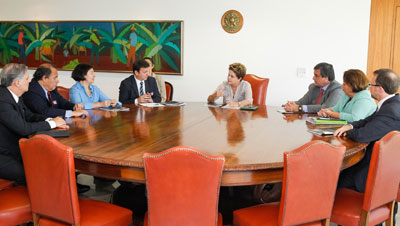“The federal government is fully committed to continue fighting against impunity in cases of killed journalists,” Brazilian President Dilma Rousseff told a CPJ delegation during a meeting on Tuesday in Brasilia, the country’s political capital. Accepting that deadly violence against the media is a detriment to freedom of the press, Rousseff said her administration will implement a mechanism to prevent deadly attacks, protect journalists under imminent risk, and support legislative efforts to federalize crimes against freedom of expression.
The meeting was part of a CPJ mission to Brazil to launch our special report, “Halftime for the Brazilian Press: Will justice prevail over censorship and violence?” and meet with high-ranking officials in all branches of the federal government and present them with concrete recommendations. We are also meeting with members of the Brazilian press to express our concern about the spike in murders of journalists and the use of privacy laws to silence the media.
The hour-and-a-half meeting with Rousseff took place at the official workplace of the Brazilian president, known as the Palácio do Planalto–a building designed by Oscar Niemeyer, inaugurated in 1960, and located in the square of the three powers (Praça dos Três Poderes) with Congress and the Supreme Federal Tribunal. Joining me were CPJ board member María Teresa Ronderos; Ricardo Uceda, executive director of the regional press group Instituto Prensa y Sociedad (IPYS) and member of the advisory group to CPJ’s Americas program; and Fernando Rodrigues, a prominent journalist with the national daily Folha de São Paulo, the UOL news portal, and founding member of the Brazilian Association of Investigative Journalism (ABRAJI).
Murders of journalists, judicial censorship, and dozens of press freedom violations during the massive anti-government protests that started in June 2013 have led the Brazilian government to the realization that the local media landscape faces serious challenges. The gravity of the issue was clear on Tuesday when Rousseff brought three cabinet ministers–Justice Minister José Eduardo Cardozo, Human Rights Minister Ideli Salvatti, and Social Communications Minister Thomas Traumann, the president’s spokesman–to discuss the CPJ report.
After our delegation presented our findings and hailed the recent progress toward combatting impunity–convictions have been obtained in four Brazilian journalists’ murders since August– and the approval of Brazil’s landmark law on Internet rights, the Marco Civil da Internet, Rousseff took a few minutes to talk about the street demonstrations that resulted in dozens of journalists being detained, harassed, or attacked by law enforcement and by protesters over the past year. Rousseff lamented the death of cameraman Santiago Ilídio Andrade in early 2014 and said, “Interaction and dialogue between law enforcement, media companies and journalists is key to avoid more incidents.” Cardozo said the government has started courses to train police.
Rousseff also said her administration has the political will to pursue a goal of “zero impunity” in journalists’ murders. CPJ research shows that at least 10 journalists have been murdered in direct reprisal for their work since Rousseff came to power at the start of 2011, while five others were murdered in unclear circumstances. Rousseff said she is willing to speak publicly about progress in this field, and she committed to addressing the issue during the United Nations General Assembly in September.
In terms of action to prevent further attacks on the press, Rousseff and the ministers of justice and human rights said expansion of the national protection program for human rights defenders explicitly to journalists under threat will be implemented, but did not provide a time frame for its execution. Regarding legal reforms that would federalize crimes against freedom of expression, Rousseff said this is something Congress should debate, while Cardozo noted that even without new legislation there are already instances in which federal authorities can intervene in investigations into crimes against the press.
Later Tuesday, the launch of CPJ’s report–organized by the magazine and Web portal Imprensa as part of a forum on democracy and freedom of expression at the Press Museum in Brasilia–was attended by local journalists, free press advocates, and university students. Today, our delegation will meet with Henrique Alves, president of the Chamber of Deputies, the lower house of Brazil’s Congress; and Brazilian Chief Justice Joaquim Barbosa, with whom we will discuss judicial censorship.
[Reporting from Brasilia]
